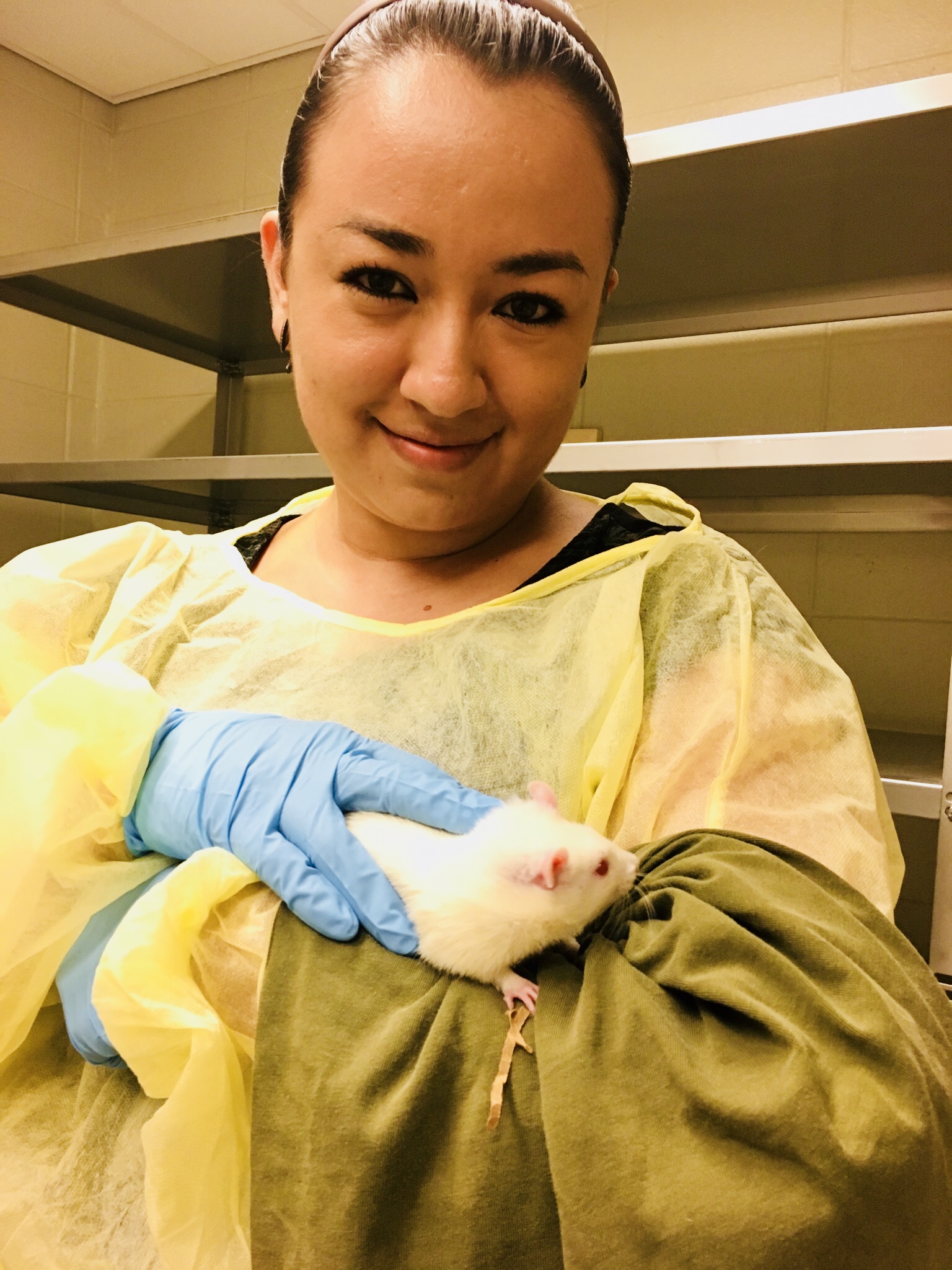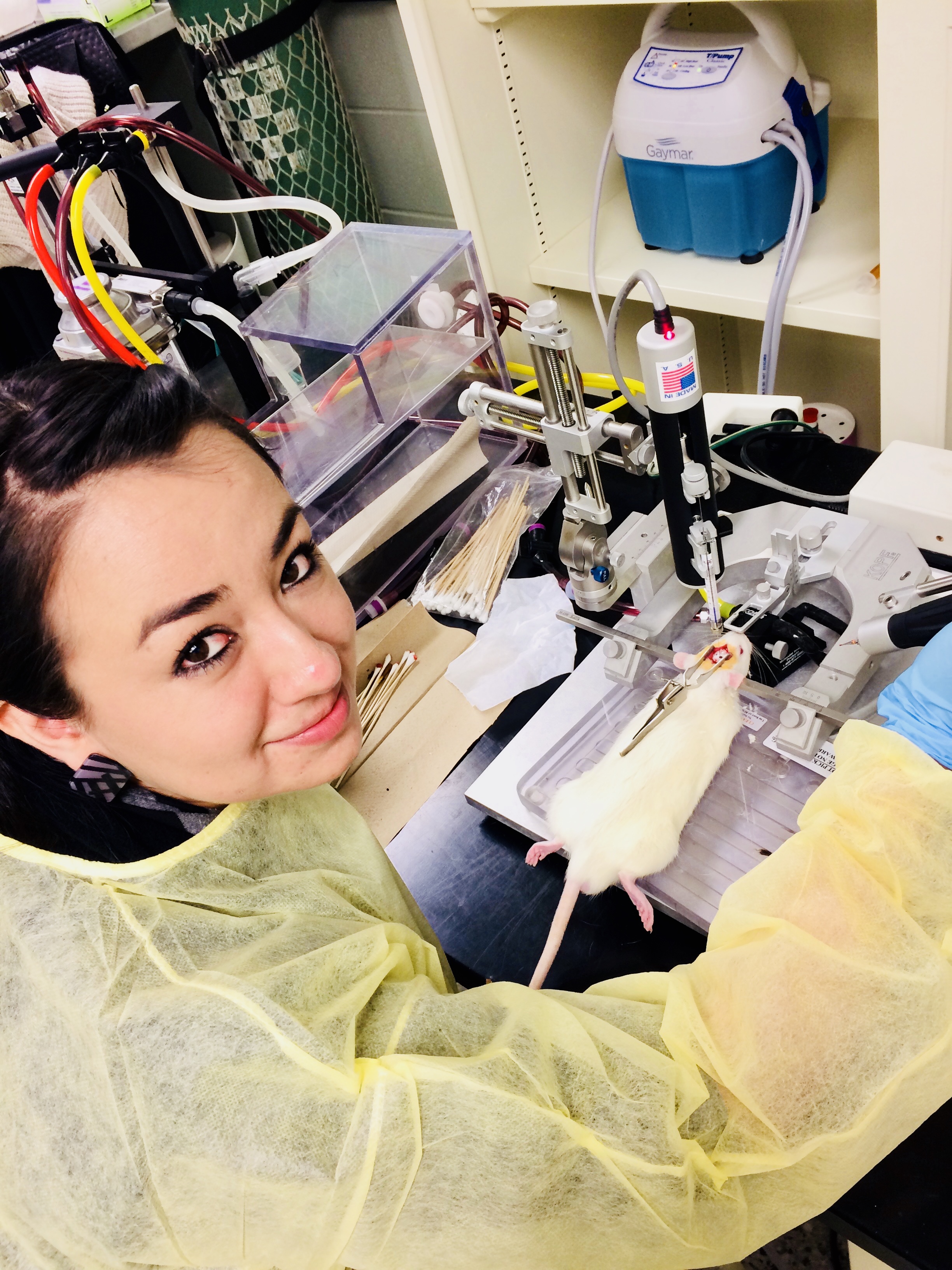
Paola Cristina Montenegro Larrea

Training Group:
Integrative Neuroscience
Mentor / Lab:
Dr. Chris Rochet
Specific Research Area / Project:
Effects of the A53E substitution on alpha synuclein aggregation and neurotoxicity in Parkinson's disease
Undergraduate Institution:
Pontificia Universidad Catolica del Ecuador
Research Profile:
Parkinson’s disease (PD) is characterized by the presence in post-mortem brains of Lewy bodies with aggregated forms of alpha-synuclein (aSyn), a presynaptic protein that exists as both cytosolic and membrane-bound forms. Neuropathological findings suggest that aggregated aSyn is involved in neuronal cell death. However, mechanisms by which aSyn forms neurotoxic aggregates in PD are poorly understood. Data obtained by our group and others suggest that a disruption of interactions between aSyn and phospholipid membranes leads to a shift to an ‘exposed’ conformation that favors aggregation of the protein at membrane surfaces2. To further address this hypothesis, we characterized a new familial PD mutant form of aSyn, A53E, in terms of its propensity to undergo membrane-induced aggregation and elicit neurotoxicity, based on the rationale that the introduction of a negatively charged residue at position 53 could potentially interfere with aSyn-membrane interactions. The results of our studies yield insights into the molecular basis for the neurotoxicity of A53E and shed light on a potential role for membrane-induced aSyn aggregation in PD pathogenesis in vivo, thus setting the stage for developing therapies to slow neurodegeneration in the brains of PD patients.
The complexity of Parkinson's disease (PD) demands to be investigated at different levels in order to understand the nature of this catastrophic neurological motor impairment and propose valid therapies that can stop the neuronal degeneration. Our efforts are focused on finding molecular targets that can be modified in a controlled manner in order to discover potential therapies that can diminish the progression of PD. To meet our goals, it is necessary to combine biochemical, biophysical, cellular analysis, molecular biology, genetic, in vivo, and behavioral strategies. Our research skills allowed us to perform all this different disciplines in order to gather the data that will help to elucidate neurotoxic mechanisms that rule PD. Further more, our results will provide encouraging data that in the future can be translated into promising clinical trials and patient therapies which encompasses our research within medical and public health areas.

About Me:
Since the beginning, the interdisciplinary life science PULSe program guided me into what would be the most enriching experience of my life. Back in 2013, when I was accepted into the PULSe program, I had already in mind that I wanted to be part of the development of new molecular strategies that could advance personalized medicine, but I did not know how I was going to meet my goal. Four fantastic rotations in completely different laboratories led me to understand that in order to be part of the big picture, I had to choose a scientific field where I could give my best and learn as much as possible. When I discussed my fourth rotation with Dr. Chris Rochet, I was surprised that he was explaining research projects that spanned multiple CNS disorders. I then realized that the interests of this lab were not limited to a single disease or technique. Instead this was a genuine interdisciplinary laboratory with limitless options in neuroscience. When I joined Dr. Rochet’s laboratory in 2014, I knew that I would meet my goals of contributing to the development of innovative techniques to advance the study of brain disorders. I feel proud to say that thanks to the PULSe program and the exceptional mentorship of Dr. Chris Rochet, I have become a contributing member of the scientific community that is working tirelessly to prevent the progression of neurodegenerative diseases.
During my years in the PULSe program, I was afforded outstanding opportunities to share my project at the World Parkinson Congress, Society for Neuroscience annual meetings, and other symposia sponsored by scientific travel awards, where our in vivo model captured the attention of many scientific colleagues who offered their suggestions for improvement and opportunities for collaboration. The powerful tool that we have developed allowed us to propose future in vivo PD treatment studies aimed at testing the effects of proteins with neuroprotective activity on aSyn toxicity. These proposals were selected for funding, during the same year, as research awards given by the Purdue Research Foundation and the Medicinal Chemistry and Molecular Pharmacology Endowment, as well as a grant from the Michael J. Fox Foundation. During my Ph.D., I spearheaded the optimization of rat midbrain primary neuronal culture, and these efforts enabled me to carry out mechanistic studies related to the toxin-based development of PD (in collaboration with the laboratory of Dr. Jason Cannon). The results of this collaborative study were recently published in the journal Neurotoxicology. In addition, a first-author manuscript detailing the optimization of our rat midbrain culture protocol for the study of PD is in the final stages of preparation, and another first-author paper summarizing the A53E study will be submitted soon afterwards. As part of the PULSe program, I developed skills in mentorship by serving as a judge in the PULSe spring reception, taking part in science nights, and presenting at the PULSe retreat poster session, where I had the chance to share this wonderful experience with new PULSe students. I feel grateful that at the end of my doctorate program I have cultivated new skills that will allow me to become part of a network of scientists dedicated to high-quality research, with the purpose of breaking down limitations of performing first-rate science in developing countries, including my native country of Ecuador.
Life After PULSe:
After PULSe, I was very fortunate to find a post-doctoral position at Harvard Medical School, under the direction of Dr. Jie Shen, one of the top investigators of Alzheimer’s and Parkinson’s diseases. My training in the PULSe program under the guidance of Dr. Chris Rochet allowed me to develop and collaborate in research projects with high relevance for patients who suffer from neurodegenerative diseases. As part of the PULSe program, I feel that I acquire all the necessary skills to continue investigating the causes of brain diseases and hopefully with the learned knowledge and critical thinking, I and my groups, will be able to find suitable gene therapy strategies that can help families with these diseases. The PULSe program was the perfect catapult to continue my career in academia and as a contributing neuroscientist.
Awards:
- 2018 Purdue University - Office of Interdisciplinary Programs - Excellence in Research Award
- 2017 Purdue University - Purdue Research Foundation (PRF) Fellowship
- 2017 Purdue University - MCMP Endowment Research Award
- 2017 Purdue University, College of Pharmacy – Rodger D. Logan Travel award
- 2018 Purdue Institute for Integrative Neuroscience – Travel Grant
- 2016 World Parkinson Congress – Travel Award
- 2013 Purdue University - Graduate School´s Lynn Fellowship
- 2013 Purdue University - PULSe Program Assistantship
- 2012 Ecuadorian Government - Senescyt Research Scholarship
Publications:
- Montenegro P.C., Rochet J.C. et al. 2018 Optimized rat primary midbrain mix-culture for the study of Parkinson’s disease. In preparation.
- Cruz-Hernandez A., Agim, Z.S., Montenegro P.C., McCabe G.P., Rochet J.C., Cannon J.R., 2018. Selective dopaminergic neurotoxicity of three heterocyclic amine subclasses in primary rat midbrain neurons. Neurotoxicology 65:68-84.
- Bademci G., Lasisi A., Yariz K.O., Montenegro P.C., Menendez I., Vinueza R., Paredes R., Moreta G., Subasioglu S., Blanton S., Fitoz S., Incesulu A., Sennaroglu L., Tekin M. 2015. Novel domain-specific POU3F4 mutations are associated with X-Linked deafness: examples in different populations. BMC Medical Genetics 16:9.
- Hervas F., Torres K.P., Montenegro P.C., del Pino E.M. 2014. Development and gastrulation in Hyloxalus vertebralis and Dendrobates auratus (Anura: Dendrobatidae) Amphibian and Reptile Conservation 8(1), 121-135 (e90)
- Montenegro P.C., del Pino E.M. 2011. La gastrulación de Epipedobates anthonyi (Anura: Dendrobatidae) Revista Ecuatoriana de Medicina y Ciencias Biológicas XXXII1(2), 24-32.
- Del Pino E.M., Venegas M.F., Romero A., Montenegro P.C., Sáenz N., Moya I.M., Alarcón I., Sudou N., Taira M. 2007. A comparative analysis of frog early development. Proceedings of the National Academy of Sciences of the United States of America (PNAS) 104(29), 11882-11888.
Presentations:
- 2018 Poster: Office of Interdisciplinary Graduate Programs Spring Reception. West Lafayette, IN, USA.
- 2017 Poster: Society for neuroscience annual meetig. Greater Indiana Chapter. West Lafayette, IN, USA.
- 2018 Poster: Health and Disease: Science, Technology, Culture and Policy Research Poster Session. West Lafayette, IN, USA.
- 2017 Poster: 48th Society for Neuroscience (SfN) Annual Meeting: Neuroscience 2017. Washington, DC, USA.
- 2017 Poster: 1ST Purdue Medicinal Chemistry and Molecular Pharmacology Retreat. Turkey Run, IN, USA.
- 2017 Poster: 1st Purdue Institute for Integrative Neuroscience Retreat St. Joseph, MI, USA.
- 2016 Poster: 4th World Parkinson’s Congress. Portand, OR, USA.
- 2016 Poster: Indiana Chapter of the Society for Neuroscience: IndySfN 2016. Indianapolis, IN, USA.
- 2015 Poster: 45th Society for Neuroscience (SfN) Annual Meeting: Neuroscience 2015. Chicago, IL, USA.
- 2015 Poster: Grand Challenges in Parkinson’s disease. Grand Rapids, MI, USA
- 2012 Speaker: International Course of Deafness, From the Clinic to the Molecular. México DF, México.
- 2012 Speaker: 3RD Ecuadorian Human Genetics Congress. Quito, Ecuador.
- 2011 Speaker: Real Time PCR Foundations and Applications in Biology and Medicine Course. Quito, Ecuador.
- 2009 Speaker: 2ND Ecuadorian Human Genetics Congress. Quito, Ecuador.
- 2009 Participant: V Human and Medical Genetics Latin American Course. Caxias do Sul, Brazil.
- 2008 Participant: Molecular Techniques for Genome Analysis CourseQuito, Ecuador.
- 2008 Speaker: 1ST International Symposium P.U.C.E. – Fulbright. Quito, Ecuador.
- 2005-2007 Speaker: XIX, XXX and XXXI National Biology Conference. Manta – Quito – Guayaquil, Ecuador.

